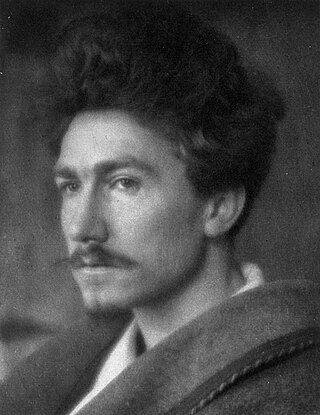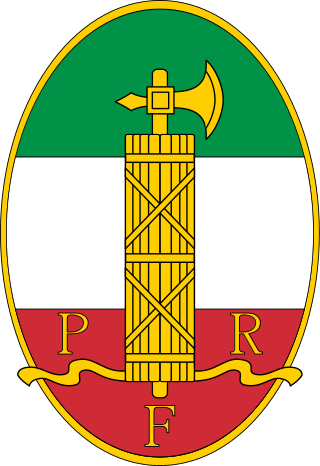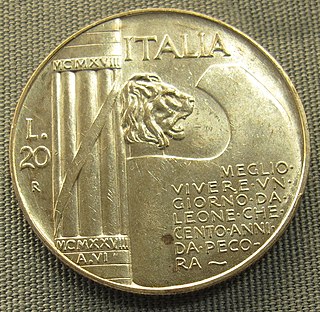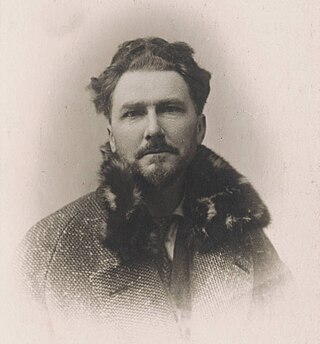Related Research Articles

Fascism is a far-right, authoritarian, ultranationalist political ideology and movement, characterized by a dictatorial leader, centralized autocracy, militarism, forcible suppression of opposition, belief in a natural social hierarchy, subordination of individual interests for the perceived good of the nation and/or race, and strong regimentation of society and the economy.

Ezra Weston Loomis Pound was an expatriate American poet and critic, a major figure in the early modernist poetry movement, and a collaborator in Fascist Italy and the Salò Republic during World War II. His works include Ripostes (1912), Hugh Selwyn Mauberley (1920), and his 800-page epic poem, The Cantos.
Neo-fascism is a post–World War II far-right ideology that includes significant elements of fascism. Neo-fascism usually includes ultranationalism, racial supremacy, populism, authoritarianism, nativism, xenophobia, and anti-immigration sentiment, as well as opposition to liberal democracy, social democracy, parliamentarianism, liberalism, Marxism, capitalism, communism, and socialism. As with classical fascism, it proposes a Third Position as an alternative to market capitalism.
William Hugh Kenner was a Canadian literary scholar, critic and professor. He published widely on Modernist literature with particular emphasis on James Joyce, Ezra Pound, and Samuel Beckett. His major study of the period, The Pound Era, argued for Pound as the central figure of Modernism, and is considered one of the most important works on the topic.

Roger David Griffin is a British professor of modern history and political theorist at Oxford Brookes University, England. His principal interest is the socio-historical and ideological dynamics of fascism, as well as various forms of political or religious fanaticism.
Clerical fascism is an ideology that combines the political and economic doctrines of fascism with clericalism. The term has been used to describe organizations and movements that combine religious elements with fascism, receive support from religious organizations which espouse sympathy for fascism, or fascist regimes in which clergy play a leading role.

Eustace Clarence Mullins Jr. was an American white supremacist, antisemitic conspiracy theorist, propagandist, Holocaust denier, and writer. A disciple of the poet Ezra Pound, his best-known work is The Secrets of The Federal Reserve, in which he alleged that several high-profile bankers had conspired to write the Federal Reserve Act for their own nefarious purposes, and then induced Congress to enact it into law. The Southern Poverty Law Center described him as "a one-man organization of hate".
The Third Position is a set of neo-fascist political ideologies that were first described in Western Europe following the Second World War. Developed in the context of the Cold War, it developed its name through the claim that it represented a third position between the capitalism of the Western Bloc and the communism of the Eastern Bloc.

The National Socialist League (NSL) was a short-lived Nazi political movement in the United Kingdom immediately prior to the Second World War.

John Warburton Beckett was a British politician who was a Labour Party MP from 1924 to 1931. During the 1930s, he joined the fascist movement, first in the British Union of Fascists and later as a founder of the National Socialist League. During World War II, he was interned in Britain.

Literary modernism, or modernist literature, originated in the late 19th and early 20th centuries, and is characterized by a self-conscious separation from traditional ways of writing in both poetry and prose fiction writing. Modernism experimented with literary form and expression, as exemplified by Ezra Pound's maxim to "Make it new." This literary movement was driven by a conscious desire to overturn traditional modes of representation and express the new sensibilities of the time. The immense human costs of the First World War saw the prevailing assumptions about society reassessed, and much modernist writing engages with the technological advances and societal changes of modernity moving into the 20th century. In Modernist Literature, Mary Ann Gillies notes that these literary themes share the "centrality of a conscious break with the past", one that "emerges as a complex response across continents and disciplines to a changing world".

The Republican Fascist Party was a political party in Italy led by Benito Mussolini during the German occupation of Central and Northern Italy and was the sole legal representative party of the Italian Social Republic. The PFR was the successor to the National Fascist Party but was more influenced by pre-1922 early radical fascism and anti-monarchism, as its members considered King Victor Emmanuel III to be a traitor after his signing of the surrender to the Allies.

Lieutenant-Colonel Graham Seton Hutchison was a British First World War army officer, military theorist, author of both adventure novels and non-fiction works and fascist activist. Seton Hutchison became a celebrated figure in military circles for his tactical innovations during the First World War but would later become associated with a series of fringe fascist movements which failed to capture much support even by the standards of the far right in Britain in the interbellum period. He made a contribution to First World War fiction with his espionage novel, The W Plan.
British fascism is the form of fascism which is promoted by some political parties and movements in the United Kingdom. It is based on British ultranationalism and imperialism and had aspects of Italian fascism and Nazism both before and after World War II.

The Italian Social Movement was a neo-fascist political party in Italy. A far-right party, it presented itself until the 1990s as the defender of Italian fascism's legacy, and later moved towards national conservatism. In 1972, the Italian Democratic Party of Monarchist Unity was merged into the MSI and the party's official name was changed to Italian Social Movement – National Right.

Anti-fascism is a political movement in opposition to fascist ideologies, groups and individuals. Beginning in European countries in the 1920s, it was at its most significant shortly before and during World War II, where the Axis powers were opposed by many countries forming the Allies of World War II and dozens of resistance movements worldwide. Anti-fascism has been an element of movements across the political spectrum and holding many different political positions such as anarchism, communism, pacifism, republicanism, social democracy, socialism and syndicalism as well as centrist, conservative, liberal and nationalist viewpoints.

Roger Eatwell is a British academic currently an Emeritus Professor of Politics at the University of Bath.

The Era Fascista was a calendar era used in Fascist Italy. The March on Rome, or more precisely the accession of Mussolini as prime minister on 29 October 1922, is day 1 of Anno I of the Era Fascista. The calendar was introduced in 1926 and became official in Anno V (1927). Each year of the Era Fascista was an Anno Fascista, abbreviated A.F.

The expatriate American poet Ezra Pound recorded or composed hundreds of broadcasts in support of fascism for Italian radio during World War II and the Holocaust in Italy. Based in Italy since 1924, Pound collaborated with the fascist regime of Benito Mussolini and expressed support for Adolf Hitler. Written at first for EIAR, and later for a new radio station in the Salò Republic, a Nazi puppet state in northern Italy, the broadcasts contained deeply antisemitic and racist material. They were transmitted to England, central Europe, and the United States, mostly in English, but also in Italian, German, and French.

If This Be Treason ... is a 33-page booklet published privately in Italy in early 1948 by Olga Rudge, mistress of the American poet Ezra Pound. Pound, who lived in Italy with his wife from 1924 to 1945, was indicted in absentia for treason in 1943 by the United States District Court for the District of Columbia after he made hundreds of radio broadcasts, pro-Axis and deeply antisemitic, on behalf of Fascist Italy during World War II and the Holocaust in Italy. The title phrase had previously been used in a speech by Patrick Henry in 1765.
References
- 1 2 "Feldman Matthew". World Who's Who. Routledge.
- ↑ https://www.academicconsulting.co.uk/the-radical-right
- ↑ Dearden, Lizzie (26 July 2020). "New neo-Nazi terrorist groups will emerge as government bans 'not effective', experts warn". The Independent.
- ↑ Colborne, Michael and Hajdari, Una (14 May 2020). "Europe's Far-Right has a Cure for COVID-19: Nationalism". BalkanInsight.
- ↑ "Neo-Nazi teenager convicted of preparing to commit terrorist acts". ITV News, 20 November 2019.
- 1 2 "Curriculum Vitae – Professor Matthew Feldman". Teesside University.
- ↑ "Teesside University expert contributes to debate on the far-right". Teesside University, 5 September 2017.
- ↑ Feldman, Matthew (9 August 2015). "Doublespeak: Radical Right Rhetoric Today". Fair Observer. Retrieved 24 April 2023.
- ↑ "The BBC Internview with Matthew Feldman on David Irving & Holocaust Denial Essays & Editorials www.HolocaustResearchProject.org". www.holocaustresearchproject.org. Retrieved 24 April 2023.
- ↑ "PIER Public Lecture Series 2021-22: Key issues in radical right terrorism and counter-terrorism - Anglia Ruskin Creative Showcase". creativeshowcase.aru.ac.uk. Retrieved 24 April 2023.
- ↑ "ISD at the Bradford Literature Festival: The rise of right-wing politics". ISD. Retrieved 24 April 2023.
- ↑ "Prof Matthew Feldman – National Expert Witness Agency" . Retrieved 24 April 2023.
- ↑ Hadjiyiannis, Christos (Fall 2015). "Reviewed Work: Ezra Pound's Fascist Propaganda, 1935–45 by Matthew Feldman". Journal of Modern Literature. 39(1), pp. 112–126. doi : 10.2979/jmodelite.39.1.112
- ↑ Marsh, Alec (September 2014). "Matthew Feldman: Ezra Pound's Fascist Propaganda, 1935-1945". Make It New: The Ezra Pound Society Magazine, Volume 1.